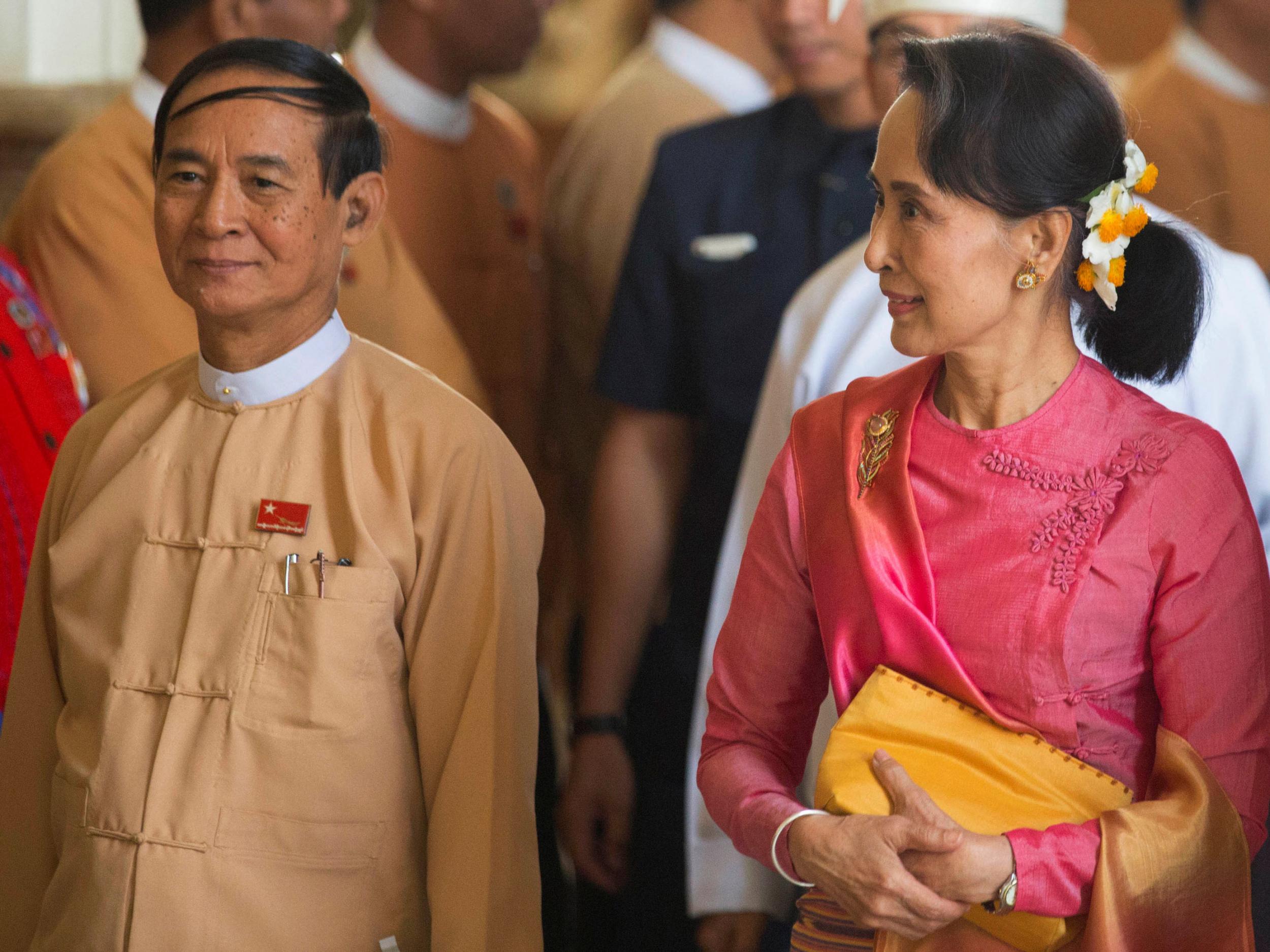Myanmar elects Aung San Suu Kyi aide Win Myint as president
Loyalist beats military-backed candidate

Your support helps us to tell the story
From reproductive rights to climate change to Big Tech, The Independent is on the ground when the story is developing. Whether it's investigating the financials of Elon Musk's pro-Trump PAC or producing our latest documentary, 'The A Word', which shines a light on the American women fighting for reproductive rights, we know how important it is to parse out the facts from the messaging.
At such a critical moment in US history, we need reporters on the ground. Your donation allows us to keep sending journalists to speak to both sides of the story.
The Independent is trusted by Americans across the entire political spectrum. And unlike many other quality news outlets, we choose not to lock Americans out of our reporting and analysis with paywalls. We believe quality journalism should be available to everyone, paid for by those who can afford it.
Your support makes all the difference.Myanmar’s parliament has elected a close aide of de-facto leader Aung San Suu Kyi as president.
The loyalist beat a military-backed candidate, while Ms Suu Kyi retained executive authority over the government.
It came as the country’s civilian government struggled to implement peace, with Myanmar's powerful army under heavy international criticism for its brutal counterinsurgency campaign against the nation's Rohingya Muslims.
Win Myint, 66, replaces another Ms Suu Kyi loyalist, Htin Kyaw, who retired last week due to ill health. Mr Win Myint is a long-serving member of her National League for Democracy – an affiliation that led to his becoming a political prisoner under the previous military government.
Myanmar’s army ruled the country for half a century, during which it was accused of widespread abuses. The armed forces relinquished some of its power to the civilian government in 2016, but it remains in charge of security matters.
The army is responsible for mass village-burnings and the widespread rape and murder of the country’s Rohingya Muslim population in Myanmar’s western Rakhine state, which has seen nearly 700,000 Muslim Rohingya flee to Bangladesh since August. The United States and UN have described the operation as ethnic cleansing, which Myanmar denies.
When Ms Suu Kyi’s government was installed in 2016 and she was made state counsellor, she said she would be “above the president”, a position largely supported by her party and the public.
The state counsellor role was created especially for Ms Suu Kyi because she is constitutionally banned from the presidency. A clause in the 2008 military-drafted constitution bars anyone with a foreign spouse or child from holding the job. Ms Suu Kyi’s two sons are British, as was her late husband.
Myanmar’s president is elected by a joint sitting of the two houses of parliament from among the country’s three vice presidents, representing the lower house, the upper house and the military.
Mr Win Myint, the vice president backed by Ms Suu Kyi’s ruling party and selected by the lower house, received 403 votes from the combined houses. Meanwhile, Myint Swe, the vice president supported by the military, had 211 votes and Henry Van Tio, the vice president selected by the upper house, had 18.
The National League for Democracy’s (NLD) landslide election victory in late 2015 gave it large majorities in both houses.
But under the constitution, the military holds special privileges in the country’s administration, including a 25 per cent share of parliamentary seats and the three security portfolios in the cabinet.
Having been both a member of the NLD’s Central Executive Committee and speaker of the lower house for two years shows Mr Win Myint holds the skills to be president, said Win Zaw, a party representative sitting in the lower house
“We hope that he will do great work as the president, and I am sure he will use his power to do the best he can for the country,” he said.
Mr Win Myint was a successful parliamentary candidate in the 1990 general election, but the military invalidated the poll and he was denied a seat. He was elected in 2012 and again in 2015.
Born in the Irrawaddy Delta in 1951, Mr Win Myint won his degree in geology in Yangon, only to become a lawyer in the 1980s. He became involved with the NLD in the party's infancy, during the failed anti-military uprising of 1988, which led to his brief stint in prison. In 2010, he became a member of the Central Executive Committee of Suu Kyi’s party.
“Win Myint was educated as a lawyer and has been loyal to the party as well,” said Aung Shin, a close friend and colleague. “More importantly, he has always worked together with Aung San Suu Kyi and they have mutual trust. I see him as a very reliable person who will be a great president for the country, and people are very optimistic about him.”
Khin Zaw Win, director of the Tampadipa Institute, a policy advocacy group, questioned whether Mr Win Myint’s loyalty to Ms Suu Kyi was an asset.
“To those who are asking, he will be forever Aung San Suu Kyi’s henchman,” he said. “I don’t expect much change in the presidency, unless Win Myint puts the country’s interests before Aung San Suu Kyi’s and that of the military.”
Associated Press contributed to this report
Join our commenting forum
Join thought-provoking conversations, follow other Independent readers and see their replies
Comments